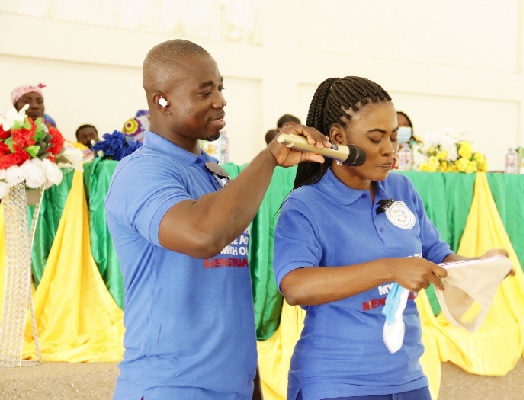
Don’t ‘disinfect’ vagina with hand sanitiser
An Obstetrician and Gynaecologist (OB/GYN), Dr John Kwamina Bosomtwe, has cautioned against using hand sanitiser as disinfectants on the vagina explaining that the composition of hand sanitiser could cause chemical irritations.
He said the vulva and vagina were very sensitive areas and applying hand sanitiser which were made mainly from isopropyl alcohol, glycerine and other harsh compounds could cause burning and irritation.
Dr Bosomtwe was responding to a question by one of the teenage girls who had gathered for a menstrual hygiene talk organised by the Touching The Lives Of Girls Foundation International (TTLGFI) at the Obuasi Senior Technical last Tuesday.
The girls asked if it was appropriate to use hand sanitiser to clean the vagina during menstruation since sanitiser consisted of germs and bacteria-killing properties.
Cleaning vagina during menstruation
Dr Bosomtwe, who is also the Medical Director of the TTLGFI, said to get rid of any blood or vaginal discharge during menstruation, the girls should simply use clean water to wash the vagina thoroughly from front to back.
Cleaning it from front to back, he explained will ensure that no germs were passed into the vagina area.
He said harsh substances such as sanitiser, soap, shower gels and antiseptics could cause dryness, itchiness and extra vaginal discharges, as they caused an imbalance in the vagina's pH levels.
He said that during menstruation, it was important to maintain proper hygiene habits to reduce the risk of infections.
"Such habits include changing sanitary pads regularly, using cotton underwear and cleaning the vagina."
Breaking myth and silence on menstruation
Nana Ama Adutwumwaa, the president of the TTLGFI, a non-governmental organisation which focuses on creating awareness of menstrual hygiene and girl empowerment, said although menstruation was a natural occurrence, there were still many myths surrounding it which made it difficult for girls to freely talk about it.
She said in some cultures, menstruation was regarded as a bad omen and so menstruating women were seen as impure.
These taboos and societal beliefs, she explained, had negative impacts on females.
She said most girls were shy to discuss their menstrual issues with their parents and teachers and resorted to different means which were not safe.
Ms Adutwumwaa lamented that some did not have access to clean sanitary products and private spaces to change their menstrual cloths, pads and to wash their hands during menstruation.
She said for such girls, their only option was to stay out of school and other public gatherings during their monthly cycle and this affected their academic progress and confidence.
She, therefore, called on parents, teachers, traditional and opinion leaders in the communities to create platforms where young girls could be taught how to properly take care of themselves during menstruation.
The District Director of Education of Obuasi East, Mrs Leticia Obeng, added that she was excited that such an opportunity had been created for young girls to know and understand their monthly cycles.
She said although menstruation was a natural occurrence that should dignify women and girls, it had been a topic of shame for a long period.
Menstrual Hygiene Day
On Friday, May 28, Ghana joined the rest of the world to mark this year’s International Menstrual Hygiene Day.
The day which is a global advocacy platform started in 2014 and is observed annually to bring together the voices and actions of non-profits, government agencies, individuals, the private sector and the media to promote good menstrual health and hygiene (MHH) for all women and girls.
At the health talk in Obuasi last Tuesday, the TTLGFI distributed sanitary pads to over 400 schoolgirls in some selected basic and senior high schools in Obuasi.
